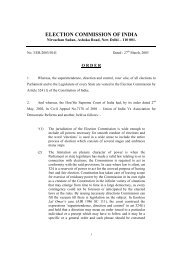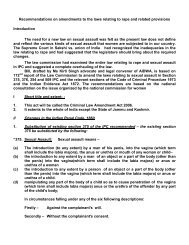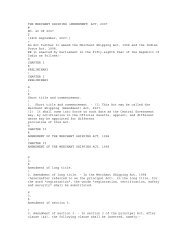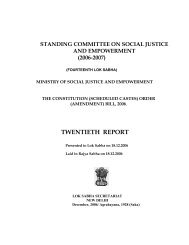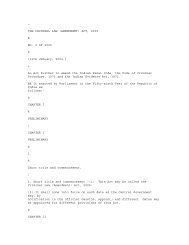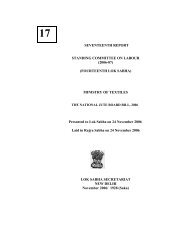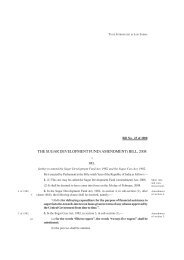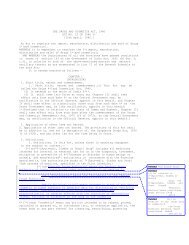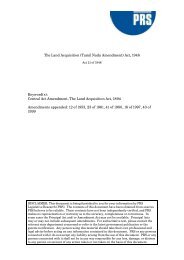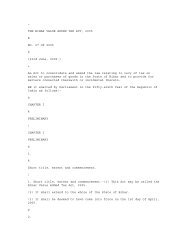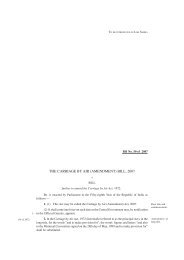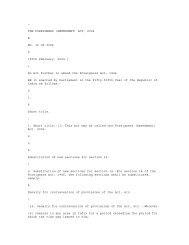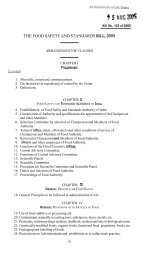Report of the Tiger Task Force - PRS
Report of the Tiger Task Force - PRS
Report of the Tiger Task Force - PRS
Create successful ePaper yourself
Turn your PDF publications into a flip-book with our unique Google optimized e-Paper software.
TIGER TASK FORCE REPORT JOINING THE DOTS ■Recommendation: Training must be institutionalised so that each reserve has skilled andcommitted personnel.5. The o<strong>the</strong>r key determinant seems to be <strong>the</strong> presence and deployment <strong>of</strong> camps within<strong>the</strong> reserves. It is clear that <strong>the</strong> reserves that seem to have made <strong>the</strong> best use <strong>of</strong> <strong>the</strong>ir camps— by increasing <strong>the</strong>ir numbers and locating <strong>the</strong>m in vulnerable areas — are <strong>the</strong> mostsuccessful. But having a camp is not enough; it is also important that <strong>the</strong> camp is used andthis requires <strong>the</strong> internal management systems <strong>of</strong> <strong>the</strong> reserve to be tight and effective.The o<strong>the</strong>r problem is that camps in many reserves lack basic facilities — <strong>of</strong> water orbuildings. Without this, it is difficult for <strong>the</strong> guards to be posted for longer durations,weakening protection. Therefore, this is clearly an area that needs investment. In Kanha,for instance, <strong>the</strong> <strong>Task</strong> <strong>Force</strong> found that an attempt had been made to provide solar energyfor charging <strong>the</strong> batteries <strong>of</strong> <strong>the</strong> wireless sets.Ano<strong>the</strong>r issue that has been raised in meetings with <strong>the</strong> guards is <strong>the</strong> need for freerations, so that <strong>the</strong>y can avoid a trip to <strong>the</strong> market, which is <strong>of</strong>ten too far. This smallexpense would save <strong>the</strong>m time and boost <strong>the</strong>ir morale. The situation <strong>of</strong> <strong>the</strong> field staff,particularly guards, in tiger reserves and o<strong>the</strong>r protected areas needs to be considered interms <strong>of</strong> facilities for <strong>the</strong>ir families. Currently, this category <strong>of</strong> staff lives within <strong>the</strong>reserves in protection camps whereas <strong>the</strong>ir families live in <strong>the</strong> staff quarters <strong>of</strong> <strong>the</strong> reserveand lack basic facilities such as schools for <strong>the</strong>ir children.In o<strong>the</strong>r words, for effective management <strong>of</strong> <strong>the</strong> reserves, we need an able, capable andwell-equipped protection force. But getting this will require serious and substantivechanges in <strong>the</strong> way we invest in our natural and human capital.Recommendation: There is a need to invest in basic facilities for <strong>the</strong> frontline staff. Thetwo key facilities this <strong>Task</strong> <strong>Force</strong> strongly recommends are:a. Housing camps in neighbouring district towns, usually where <strong>the</strong> project headquarteris based, for families so that <strong>the</strong> education <strong>of</strong> <strong>the</strong>ir children can be secured;b. Free rations for guards living in <strong>the</strong> camps. This practice is followed by manyprotection forces and helps in <strong>the</strong>ir work.c. Each reserve must create a staff welfare fund out <strong>of</strong> <strong>the</strong> income from tourism, whichcan be used to supplement medical and o<strong>the</strong>r benefits for <strong>the</strong> staff.6. These incentives must come with responsibility. Currently, <strong>the</strong> special allowancewhich is paid to staff within tiger reserves is taken for granted, as it becomes part <strong>of</strong> <strong>the</strong>pay package. It does not lead necessarily to better performances.Recommendation: Even as <strong>the</strong>re is investment in basic facilities and incentives, <strong>the</strong>remust be disincentives and rewards built into <strong>the</strong> system, based on independentmonitoring. For instance, <strong>the</strong> provision for free ration and special allowance must bewithdrawn in reserves that score low on <strong>the</strong> rating chart. This should be done withcomplete transparency so that it is not seen as political or discriminatory. In fact,this move will be a test for <strong>the</strong> independence and rigour <strong>of</strong> <strong>the</strong> independent assessmentas well.7. The issue <strong>of</strong> personnel in reserves needs a broader assessment as it concerns <strong>the</strong> state<strong>of</strong> forest-related services across <strong>the</strong> country. The assessment <strong>of</strong> this <strong>Task</strong> <strong>Force</strong> is that thisservice is facing key challenges that need urgent redressal. Our concern is:a. The number <strong>of</strong> rangers being trained in <strong>the</strong> country is virtually down to zero. In o<strong>the</strong>rwords, over <strong>the</strong> coming years, <strong>the</strong>re will be fewer trained personnel available in thissector. There are 16,000 positions for rangers in <strong>the</strong> entire country. In 2003-2005, only30 rangers passed out <strong>of</strong> <strong>the</strong> only functional training school in Kurseong, West Bengal.The way ahead 49



